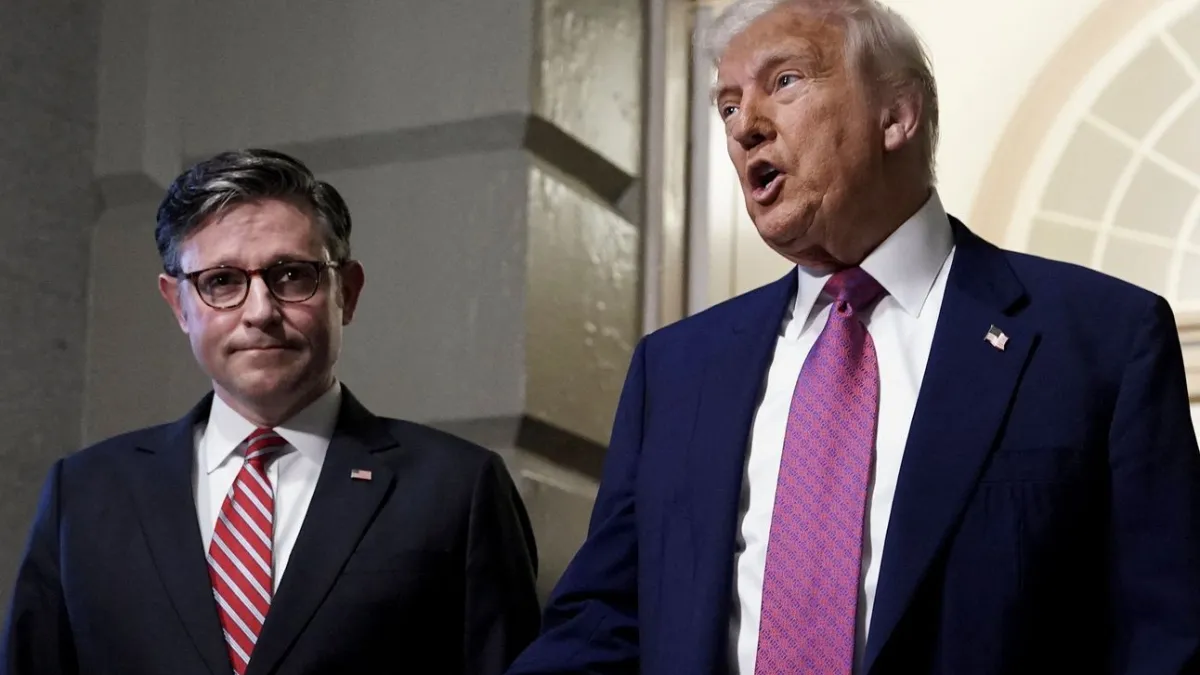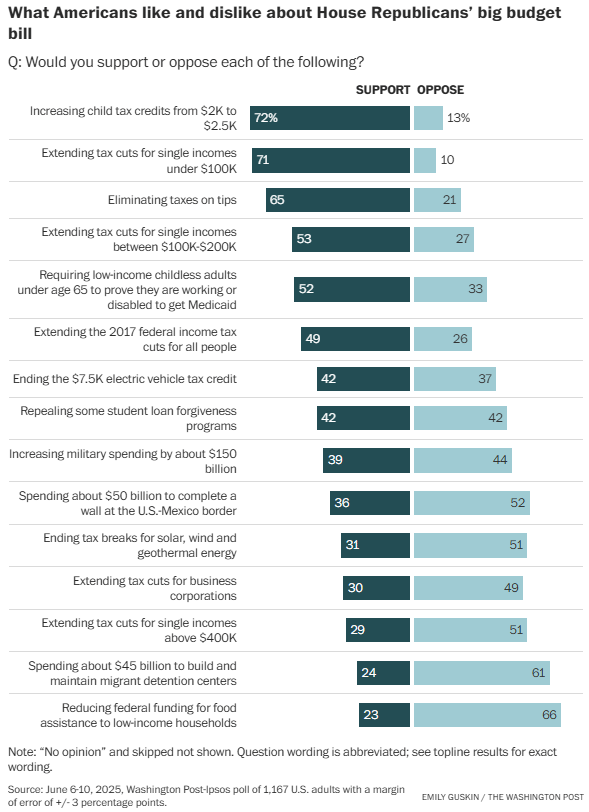
If the budgetary analyses of Republicans' "One Big Beautiful Bill Act" have produced some less-than-beautiful projections, the polling numbers for the package have been pretty ugly, too.
While the Senate continues to work on its version of the legislation, a new Washington Post-Ipsos poll finds that nearly twice as many Americans oppose the GOP plan as support it. The poll, conducted from June 6 to 10, found that 42% of American adults oppose the bill, while 23% support it and 34% say they have no opinion.
Among Republicans, 49% approve of the package, 13% oppose it and 38% have no opinion. Democrats are strongly against the GOP measure, with nearly three-quarters saying they oppose it and just 6% saying they support it. And 40% of independents oppose it, about the same percentage as say they have no opinion. Just 17% of independents support the bill.
A KFF tracking poll released today also finds that the bill is viewed unfavorably by a nearly 2-to-1 margin, with 64% against it compared to 35% for it. That poll finds that 72% of MAGA Republicans view the bill favorably, but 66% of Republicans and Republican-leaning independents who don't identify as MAGA supporters view the bill unfavorably.
Overall, the Post poll finds that about two-thirds of Americans say they have heard little or nothing about the GOP plan. In theory, that could leave Republicans room to sell their tax and spending changes - but the details of the plan appear to be unpopular with people who have heard them. Poll respondents who said they've heard "a good amount" or "a great deal" about the Republican bill oppose it by a margin of 64% to 33%, and 48% say they "strongly oppose" it.
Some elements of the bill are popular: A 72% majority supports increasing the Child Tax Credit from $2,000 to $2,500, as the House-passed plan would do. (The Senate is proposing to dial back the increase to $2,200.) About the same percentage of people approve of extending 2017 tax cuts for people making less than $100,000 a year, and 53% support extending the tax cuts for those making between $100,000 and $250,000. About two-thirds support the elimination of taxes on tips.
Divisions on Medicaid changes: More than half of Americans in the Post poll also support Medicaid work requirements for childless low-income adults under age 65. KFF's poll showed even greater support for work requirements, 68%, including nine in 10 Republicans and half of Democrats.
But in the Post poll, 44% say it's unacceptable that the GOP changes could result in about 8 million people losing Medicaid coverage, compared with 32% who say it is acceptable. (When the GOP bill's new Medicaid eligibility checks, work requirements and other changes are not specified, 63% say it's unacceptable.)
The KFF poll found that support for Medicaid work requirements can swing dramatically when people are given additional information. Backing for the bill among both Republicans and MAGA supporters specifically drops at least 20 percentage points, leaving less than half of each group viewing the law favorably, when the survey respondents hear that the country's uninsured rate would rise and funding for local hospitals would decrease. But support increases when people hear the argument that imposing work requirements could save money and help fund Medicaid for the elderly, people with disabilities and low-income children.
KFF found that Medicaid and the Affordable Care Act are now viewed more favorably than ever, with 83% of adults saying, including 93% of Democrats and 74% of Republicans, they have a positive view of Medicaid and 66% saying they support the Obama health law.
In the Post poll, about two-thirds of Americans also oppose cutting federal funding for food assistance to low-income households and 51% oppose extending tax cuts for individuals making more than $400,000. Just over half of Americans also oppose ending tax breaks for solar, wind and geothermal energy.
Worries about rising debt: Asked about the Congressional Budget Office projection that the legislation would increase the national debt by about $3 trillion over 10 years, 63% of Americans - including 81% of Democrats, 47% of Republicans and 61% of independents - say that's unacceptable. Just 13% call it acceptable, while 24% have no opinion.
The poll, which was conducted among 1,167 adults, has an overall margin of error of plus or minus 3 percentage points.
The bottom line: The GOP bill is broadly unpopular, but many or most Americans still haven't heard much about it, leaving room for both Republicans and Democrats to sway public opinion.
